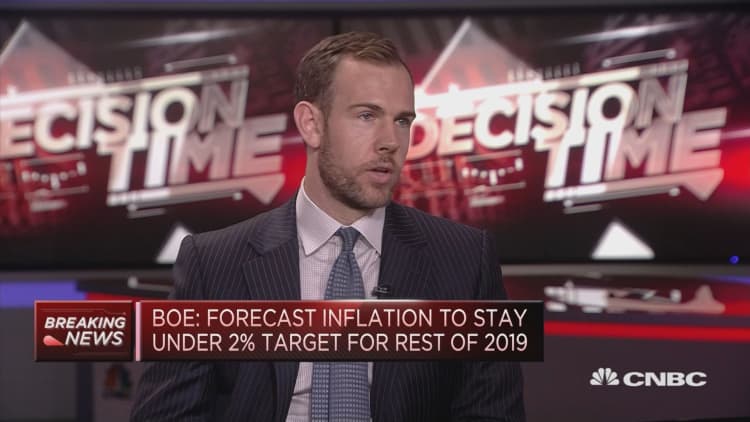
The Bank of England (BOE) held interest rates steady on Thursday, as Brexit uncertainty continues to hang over the world's fifth-largest economy.
With less than 45 days to go before the U.K. is set to leave the European Union, the BOE's nine-member Monetary Policy Committee (MPC), led by Mark Carney, unanimously voted to hold interest rates at 0.75%.
Sterling was little changed on the news, trading at around $1.2467.
Policymakers at the BOE reiterated their view that leaving the EU without a deal would slow growth and raise prices.
But, the central bank also warned that another delay to Britain's departure date could lead to further economic weakness.
"It is possible that political events could lead to a further period of entrenched uncertainty about the nature of, and the transition to, the United Kingdom's eventual future trading relationship with the European Union," the bank said in a press release.
"The longer those uncertainties persist, particularly in an environment of weaker global growth, the more likely it is that demand growth will remain below potential, increasing excess supply,"
Prime Minister Boris Johnson has promised to deliver Brexit by October 31 "come what may," even if that means leaving without a deal in place.
A "no-deal" Brexit is seen by many inside and outside of parliament as a "cliff-edge" scenario to be avoided at all costs.
Leaving without a deal in place would mean an abrupt departure from the EU with no transition period allowing businesses to adjust to life outside the bloc.
U.K. parliament has voted to require Johnson to postpone Brexit if he cannot reach a deal with Brussels soon.
The leaders of France and Finland both agreed on Wednesday that the U.K. has until September 30 to submit written proposals to replace the contentious Irish backstop policy or its relationship with the EU is "over."
Global central banks
The BOE decision comes shortly after U.K. inflation fell to its lowest level in nearly three years, according to data released by the Office for National Statistics.
The annual rate dipped to 1.7% in August, after an increase of 2.1% in July, taking inflation down to its weakest level since December 2016. The BOE's target for inflation is 2%.
It reaffirmed the view among many investors that the BOE would not adjust rates in September.
CME Group's BOE watch tool puts the probability of a rate cut at the central bank's meeting in early November at 13%, with most investors expecting no change to borrowing costs less than one week after the U.K.'s scheduled departure date.

Central banks around the world have been loosening monetary policy in recent weeks, amid intensifying worries about low inflation, slowing global growth and a possible recession.
The U.S. Federal Reserve announced it would cut interest rates to a target range of 1.75% to 2% on Wednesday but offered few indications that further reductions would follow over the coming months.
Major U.S. stock exchanges dropped after the decision was announced, with policymakers at the central bank split over what to do next.
Meanwhile, the Bank of Japan held interest rates steady on Thursday, as widely expected, but signalled it could ease borrowing costs as soon as next month.
Last week, the European Central Bank cut its main deposit rate by 10 basis points to -0.5%, a record low but in line with market expectations.


